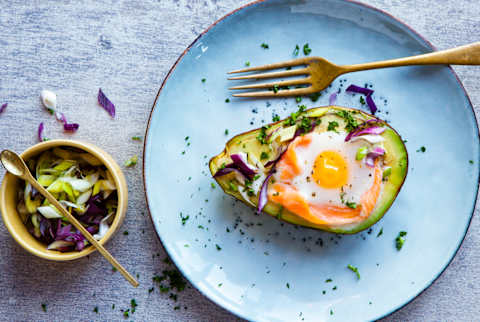3 Snacks To Eat For Better Heart Health & Blood Sugar, According To Research


Let’s face it: Snacking is a routine part of our day. At least 90% of Americans have at least one snack a day. So the goal isn’t to eliminate all snacks, but to choose ones that are nourishing and filling.
The question is: What foods are best? Well, three new studies were published over the summer, specifically looking at how snacking on whole foods (with a combo of healthy fats, fiber, and a bit of protein) stacks up against carbohydrate alternatives.
Here are the three foods, how they impact your health, and tips for incorporating them into your day.
Almonds for metabolic health
Almonds are already a pantry staple for many. Plus, they’re rich in vitamin E, monounsaturated fats, and even pack a bit of protein.
A study published in Nutrition Research recently looked at how snacking on two ounces of almonds a day1 for 12 weeks versus just snacking on crackers impacted the health of folks with metabolic syndrome (a cluster of conditions that raise the risk of heart disease and diabetes).
Almond eaters saw improvements in cholesterol levels (both total and LDL, the “bad” cholesterol), a slight reduction in waist size, and higher intakes of key nutrients like vitamin E, fiber, magnesium, and monounsaturated.
Importantly, almonds also appeared to support gut health. They improved markers of gut barrier function and reduced intestinal inflammation in participants who started out with higher levels of inflammation.
How to eat: Two ounces of almonds is just shy of a half cup. You can snack on almonds solo, pair them with a fruit (like an apple), or eat them with a cheese stick to make the snack itself slightly more filling.
Almonds are also a rich source of magnesium. As magnesium can help your brain and body unwind for the day, these nuts make for a great snack before bed.
Pistachios for the gut microbiome
Pistachios are another great nut to snack on before bed. And researchers of a new clinical trial were interested to see the impact this
They studied adults with prediabetes who either ate two ounces of pistachios as their evening snack or stuck with a carb-rich snack for 12 weeks.
At the end of those three months, people who ate pistachios and an increase in diversity of their gut microbiome and more beneficial bacteria were present (likely due to the 5 to 6 grams of fiber they were getting with each snack).
How to eat: Again, pistachios can make a tasty and filling snack on their own. If you’re looking to mix things up, here are five clever ways to add more pistachios to your diet.
Avocados for lower triglycerides
Avocados are a well-researched fruit. And we’ve regularly covered the benefits of eating a whole avocado (yes, the entire thing) every day.
This latest study on avocados investigated where eating an avocado at night affects your morning metabolic response.
Over three separate evenings, participants (who all had prediabetes) enjoyed either an avocado snack, a calorie-matched high-fat, high-fiber snack, or a low-fat, low-fiber snack, followed by a standard breakfast the next morning.
While overall blood sugar and inflammatory markers didn’t change, the avocado snack had a significant impact on triglycerides (the fat circulating in the blood after meals).
Participants had lower triglyceride levels three hours after breakfast compared with the other snacks, suggesting that the healthy fats and fiber in avocados may help support fat metabolism overnight.
How to eat: Don’t be afraid to eat the whole avocado! You can eat it sliced with a crack of pepper and a dash of salt or add it atop a sourdough toast (here are 12 ways to make avocado toast less boring).
The takeaway
Many packaged snacks are high in simple carbohydrates, which spike your blood sugar quickly and leave you feeling hungry again in minutes.
These studies emphasize the importance of snacking on whole foods, specifically, ones that naturally provide a balance of fiber of healthy fats.